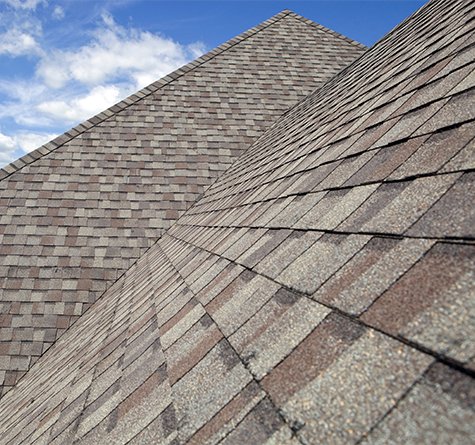A roof estimate typically includes several key components and important information for the homeowner. A roofing estimate gives the bigger picture of what the project will cost, based on the specific details of your home. For the best outcome, you’ll want as many details as possible and to be on the same page as your roof installer in terms of time frames and budget.
The 6 parts of a roofing estimate
At the bare minimum, the roofing estimate should outline the materials list, cleanup/removal, permit process, licensing and insurance, time frames, costs and payment terms.
1. Materials List
The materials list should include all the necessary materials needed to complete the job. The primary material is likely the roofing shingles and brand, used to cover the majority of your roof. Other information such as the underlayment, nail types, flashing, drip edge, ridge vent, caulk/sealant, ice/water shield and vent pipes may be included, but this varies by roofer. Special tools, fasteners and adhesives may also be mentioned. Each item is a great talking/asking point. You’ll want to ensure you’re getting a high-quality roofing system.
2. Labor Costs
The labor cost portion of a roofing quote should include the total costs and a price breakdown of the work. You should feel comfortable and understand where the sticker shock is coming from to ensure the best deal. Some roofers provide high-quality work, which is reflected in the price. But be sure to do your homework. The price breakdown may specify the costs of removing the old roof, preparation work, the installation of new materials, safety equipment required, cleanup, disposal and miscellaneous expenses. Now is a great time to ask about available financing plans.
3. Specific Roofing Information
The roofing estimate should include information about your current roof: your roof size, roof pitch and current roofing condition. The size of the roof affects the amount of materials needed while the pitch may indicate the complexity of the project. Steeper-pitched roofs may lead to higher costs if safety equipment is involved. The current condition of the roof further dictates necessary and unnecessary steps/repairs.
4. Permits and Fees
Ensure all necessary permits and fees are included in the roofing quote to avoid any unexpected costs or delays during the project. Many roofing projects require permits. Your local government may require permits to ensure the construction work complies with building codes and safety standards. Items to be addressed include building permits, zoning permits, and permit fees. If the roofing project involves any work that could potentially impact the environment, such as the removal of asbestos or the installation of a new drainage system, environmental permits may also be required. Get on the same page as your roofer! The roofing contractor should be able to provide guidance on the specific permits and fees required for the project and may be able to assist with the permit application process
5. Cleanup and Disposal
The estimate should include the cost of cleanup and disposal of old roofing materials and any other debris generated during the project. Not all cleanup and disposal costs are covered by the roofer, so this is a key point to look for. Specific entities on the quote may include the removal of debris, hauling, disposal of the old roof, site cleanup, necessary equipment and permit fees (in cases of asbestos).
6. Applicable Warranties
The estimate should specify any warranties or guarantees offered by the roofing contractor or manufacturer of the roofing materials. Here are key areas to infer upon:
-
Manufacturer warranty: This is a warranty that is provided by the manufacturer of the roofing materials and covers defects in the materials themselves. The duration and terms of the manufacturer warranty may vary depending on the type of roofing materials being used.
-
Workmanship warranty: This is a warranty that is provided by the roofing contractor and covers any defects or issues that arise as a result of poor workmanship. The duration and terms of the workmanship warranty may vary depending on the roofing contractor.
-
Transferability: Some warranties may be transferable to future owners of the property, while others may be limited to the original purchaser.
-
Exclusions and limitations: The warranties portion of the roofing quote should also include any exclusions or limitations that apply to the warranties being offered, such as exclusions for damage caused by natural disasters or improper maintenance.
-
Registration and documentation: The roofing contractor may require the property owner to register the warranties with the manufacturer or provide documentation of the installation and maintenance of the roofing materials to qualify for the warranty.
